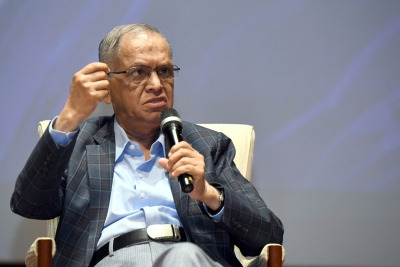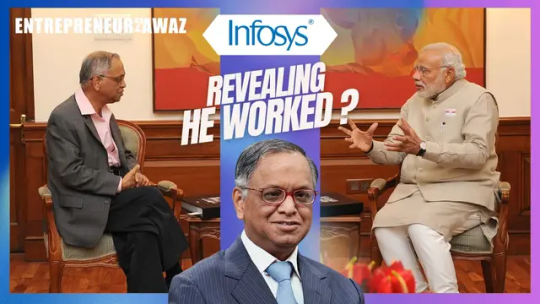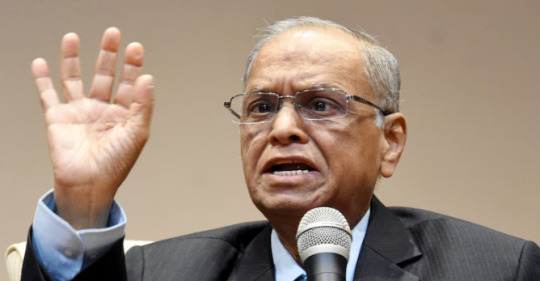#narayana murthy
Explore tagged Tumblr posts
Text
Dhruva: I think I’m in love with Daya. Any thoughts?
Murthy: And prayers. You’re going to need them.
15 notes
·
View notes
Text
“When the rich rob the poor it is called business” Mark Twain
As if we didn’t know already, the very wealthy expect the rest of us to literally work ourselves into an early grave so they can become richer still. Millionaire Rishi Sunak’s father-in-law, billionaire NR Narayana Murthy is a case in point:
“We need to be disciplined and improve our work productivity. I think unless we do that, what can poor government do? And every government is as good as the culture of the people. And our culture has to change to that of highly determined, extremely disciplined and extremely hard-working people.”
Poor government indeed! Crumbling national infrastructure and collapsing public survives are the fault of lazy working families. If only we would get up off our backsides and put in the 70 hour week Mr Murthy suggests then all would be well.
The arrogance of the super-rich knows no bounds. Working people are already putting in more hours than ever before. People Management had this headline at the beginning of the year:
“More than four million UK workers considering a second job to combat cost of living, survey finds." (09/01/23)
Even during the pandemic, when you would have expected people to be working less hours, that wasn’t necessarily the case. Forbes, the American financial and business magazine had this to say:
“We Worked Longer Hours During The Pandemic—Research Says We Need To Work Smarter, Not Harder… The extra hours worked during the pandemic would be less of a concern if they were just a temporary phenomenon, a blip on the screen. However, overwork is a longstanding problem." (Forbes:18/08/21)
The move to working from home since the pandemic has also led to an increase in hours and workload.
“Employees who work from home are spending longer at their desks and facing a bigger workload than before the Covid pandemic hit." (Guardian: 04.02/21)
And we have this from the BBC:
“Overwork culture is thriving; we think of long hours and constant exhaustion as a marker of success….New studies show that workers around the world are putting in an average of 9.2 hours of unpaid overtime per week – up from 7.3 hours just a year ago.” (BBC:Worklife: 10/04/21)
More recently we had this headline:
“In the current economic climate, Gen Zers are pulling especially long hours – and pushing themselves to the brink of burnout…18-24 (year olds) tend to put in an extra eight hours and 30 minutes of ‘free’ work per week by starting early, staying late or working during breaks and lunchtimes.” (BBC: Worklife: 29/05/23)
So Mr Murthy, people are not sitting on their backsides. They are working harder than ever, often for “free”. What’s more, many have two jobs because you and your rich friends refuse to give them a living wage, because you are more interested in accruing even more billions than you are in seeing working families being paid a living wage.
Rather than lazy workers, it is the greed of the rich and super-rich that has led to the collapse of public services and infrastructure. The system is rigged in their favour, designed for them to escape paying their fair share of taxes. As I quoted in my last blog, “Tax evasion, and, more broadly, tax avoidance, is not inevitable; it is the result of policy choices” and while we have people like Mr Murthy’s son-in-law in charge of government, nothing will ever change.
#uk politics#rishi sunak#Narayana Murthy#super rich#living wage#blame game#overwork#billionaires#tax avoidance#tax evasion#working families
11 notes
·
View notes
Text
Narayana Murthy defends 70-hour workweek concept again, calls on youth to work hard

Infosys co-founder Narayana Murthy has reiterated the call to work 70-hour a week, urging young people in India to work hard for the country’s growth.
Source: bhaskarlive.in
0 notes
Text
Narayana Murthy's Luxury Acquisition: A ₹50 Crore Flat in Bengaluru’s Kingfisher Towers
Narayana Murthy, co-founder of Infosys, has once again made waves in the Bengaluru real estate market with his latest acquisition—a luxury flat in the prestigious Kingfisher Towers for ₹50 crore. Situated on the 16th floor, the 8,400-square-foot residence boasts four spacious bedrooms and five dedicated parking spaces. The purchase marks one of the rare resale transactions in the highly exclusive complex, formerly the estate of liquor mogul Vijay Mallya. This deal, which sets a new record at ₹59,500 per square foot, further elevates Kingfisher Towers’ reputation as a haven for India’s elite.

Kingfisher Towers, with only 81 bespoke apartments across 34 stories, offers unparalleled luxury and exclusivity in the heart of Bengaluru. This latest transaction reflects the city's growing appeal as a luxury real estate hotspot. Murthy's new home is his second in the iconic tower—his wife, Sudha Murthy, had previously purchased a flat in 2020. Other notable residents of Kingfisher Towers include Biocon's Kiran Mazumdar-Shaw and the son of Karnataka’s energy minister.
Since its launch in 2010, Kingfisher Towers has seen an impressive rise in property prices, with the value per square foot increasing from ₹22,000 to more than ₹59,000, driven by Bengaluru’s booming real estate market and the scarcity of such exclusive properties. Murthy's purchase further underscores the growing demand for luxury living spaces among high-net-worth individuals in the city.
This deal cements Kingfisher Towers as a premier residential address, catering to some of the country’s wealthiest and most influential figures.
0 notes
Text

Infosys Co-founder on His 14-Hour Daily Work Schedule
In a recent interview, N.R. Narayana Murthy, the 78-year-old co-founder of Infosys, revealed that he worked 14 hours a day, six-and-a-half days a week for 30 years. His rigorous work schedule lasted until his retirement in 2011 at the age of 65. He would arrive at the office at 6:20 a.m. and leave at 8:30 p.m., a routine that he expressed being "very proud" of.
Founded in 1981 with six co-founders and just $250 in capital, Infosys has transformed into a global IT giant with a presence in 56 countries, including the United States. Today, the company employs over 317,000 people, making it one of the largest and most successful IT firms worldwide.
Infosys made history in 1999 when it became the first Indian company to be listed on NASDAQ. The company now boasts a market capitalization of more than $92 billion, with fiscal year 2024 revenue exceeding $18 billion, cementing its position as a leader in the global tech industry. Read More
0 notes
Text
Narayana Murthy Advocates Passion Over Money for Career Success

Mumbai: Renowned Infosys co-founder Narayana Murthy recently shared his career wisdom on The Great Indian Kapil Sharma Show, addressing a dilemma that many young professionals face: Should one pursue passion or money? Appearing alongside his wife and celebrated philanthropist Sudha Murthy, as well as Zomato founder Deepinder Goyal and his wife Gia Goyal, the episode was a blend of humor, heartfelt stories, and career-defining advice.
The Power of Passion in a Career
When asked by host Kapil Sharma what young people should prioritize, Murthy stressed the importance of passion as the foundation of meaningful success. “Nothing worthwhile can be achieved without passion,” he remarked. “It sustains you when you’re stuck, uncertain, or facing sacrifices. Whether it’s being away from family or weathering challenges, passion is the anchor that keeps you going.”
Murthy’s words resonated deeply, highlighting that passion fosters resilience and dedication, especially during tough times. He reflected on the early days of Infosys, emphasizing how it was passion, not the lure of financial success, that motivated him and his team to persevere through challenges.
Supporting Insights from Deepinder Goyal
Deepinder Goyal, the founder of Zomato, echoed Murthy’s sentiments. Sharing his observations from the startup world, Goyal stated, “Startups driven by passion tend to perform better. Ventures motivated solely by money often struggle to endure in the competitive market.” Goyal’s insights reinforced Murthy’s perspective, providing a modern-day validation of the timeless principle.
Entrepreneurship Beyond Tech
Kapil Sharma, known for his humor and sharp wit, received a unique compliment from Murthy, who praised his career as an entrepreneur. “Entrepreneurship is about offering something distinct, and you’ve achieved that with your humor. You’re as much an entrepreneur as anyone in the corporate world,” said Murthy, leaving Kapil visibly moved.
Sudha Murthy also chimed in, adding, “In your form of entrepreneurship, humor is your capital, and it has taken you far.” Her comment highlighted the diverse ways passion can manifest, from technological innovations to comedic brilliance.
A Takeaway for the Youth
Murthy’s advice serves as a timeless reminder for today’s generation to focus on what truly drives them. While financial rewards are important, he underlined that they often follow when one commits wholeheartedly to their passion.
The episode, a perfect blend of inspiration and entertainment, offered invaluable lessons not just for budding entrepreneurs but for anyone aiming to leave a meaningful mark in their field.
0 notes
Text
Narayana Murthy Was "Disappointed" When India Shifted To 5-Day Workweek
Infosys co-founder Narayana Murthy has defended his controversial 70-hour workweek comments and added that hard work is crucial to India's progress. “I am sorry, I have not changed my view. I will take this with me to my grave,” Mr Murthy said at the CNBC Global Leadership Summit.

The veteran entrepreneur said he was “disappointed” with India's shift from a six-day workweek to a five-day workweek in 1986. Mr Murthy also said that India's development requires sacrifice, not relaxation.
Drawing attention to Prime Minister Narendra Modi's 100-hour workweeks, he said, “When PM Modi is working that hard, the only way to show our appreciation for what's happening around us is by working just as hard.”
He pointed to the example of post-WWII Germany and Japan, suggesting India follow a similar path of hard work and national rebuilding. “This is what they did to rebuild their countries,” Mr Murthy noted.
Mr Murthy also shared personal insights into his work ethic, revealing that throughout much of his career, he maintained an intense schedule of 14-hour days, six and a half days a week. He would arrive at the office by 6:30 am and leave at around 8:40 pm. “I'm proud of it,” he said.
The 78-year-old entrepreneur firmly believes hard work is the only path to success. “We need to work hard in this country. There is no substitute for hard work. Even if you are the most intelligent guy you have to work hard.”
To improve the delivery of public services, Mr Murthy had a suggestion for PM Modi. He proposed that the government consider hiring more managers with formal training over administrators selected through the current civil services examination system.
Once a candidate is selected, he or she will be taken to Mussoorie (where the Lal Bahadur Shastri National Academy Of Administration is located) for training, where he or she will be trained in specialised sector agriculture, defence or manufacturing, which is a departure from the current practice of creating general administrators, he said.
The successful candidates will become subject matter experts once the training is over and serve the country in their respective fields for 30-40 years, Mr Murthy said.
0 notes
Text
On The Great Indian Kapil Show, Sudha Murthy shares she is a terrible cook: ‘That’s the reason behind Narayana’s weight' | Web Series
On Saturday’s episode of The Kapil Sharma Show, Infosys founder Narayana Murthy and his author wife Sudha Murthy shared delightful anecdotes from their personal life. In a candid revelation, Sudha confessed that she is a terrible cook but expressed gratitude that Narayana still appreciates her culinary efforts. Also read: The Great Indian Kapil Show: Sudha Murthy reveals Narayana Murthy failed to…

View On WordPress
0 notes
Text
Sudha Murthy's Vision for Women & Tourism
Share your thoughts on Sudha Murthy's vision for India. What resonated with you the most? Let's continue the conversation.
A Grave Concern: Cervical Cancer in IndiaSudha Murthy YouTube VideoEmpowering Women Through Health InitiativesUnveiling India’s Hidden Treasures: A Vision for TourismRemarkable Women of the Maratha EraA Life Dedicated to Service: Sudha Murthy’s LegacyA Vision for a Better India Image Courtesty – Sansad TV. Sudha Murthy ‘s Maiden Speech: A Vision for Women’s Health and Untapped Tourism Potential…
#cervical cancer#culture#empowerment#heritage#India#Infosys Foundation#Inspiration#Narayana Murthy#Rajya Sabha#speech#Sudha Murthy#tourism#travel#women&039;s health
0 notes
Text
Why Azim Premji Snubbed Narayana Murthy, and What Followed
Narayan Murthy, Infosys Founder in a candid interview on Saturday, shared a surprising revelation about his early career. Despite once applying for a job at Wipro, he was turned down, ultimately leading to the creation of Infosys—a company that would become one of Wipro’s major rivals in the IT industry. According to Murthy, former Wipro chairman Azim Premji later admitted to him that not hiring…
View On WordPress
0 notes
Text
Murthy: Don’t worry. He likes your butt and fancy hair. I overheard him tell Shanvi.
Daya: He thinks it’s fancy?
2 notes
·
View notes
Text
Achieving Success: Embracing Risks and Confronting Failure
Success is a journey marked by challenges, uncertainties, and the courage to step into the unknown. At the heart of this journey lies the willingness to embrace risks and confront failure head-on. In this blog, we will explore the essential role of risk-taking in achieving success, examining real-world examples that illustrate the transformative power of facing adversity. “In order to succeed,…

View On WordPress
#a key to success#achieve success#be bold to take risks#business success#connecting link to success#elon musk#embracing failure for success#entrepreneurship#failure#failure and success#failure as a learning opportunity#innovation#jeff bezos#learning from failure#narayana murthy#perseverance#personal growth#professional development#resilience#risk-taking#strategies for success#success#visionary leadership
1 note
·
View note
Text
Is there a middle ground for Gen Z between a 21-year-old graduate going viral for crying over a 9-5 job and Narayana Murthy's 70-hour work week?
Not to mention that there are countries with 8.5 hour necessary work hours, such as Mexico (41 hours) and Costa Rica (46 hours), while others, such as Japan, Spain, Iceland, and Belgium, continue to struggle with a four-day work week regulation. So, where is the ‘golden middle way’ for Gen Z, particularly in a post-Covid workplace? The work-life balance of Generation Z has been the subject of…

View On WordPress
#4 days a week#70 hrs. a week#Cons&039;s#debate#labour laws#Narayana Murthy#Pros#violations#Work culture
1 note
·
View note
Text

bro. cmon. are you fucking kidding me
NARAYANA MURTHY WHAT
3 notes
·
View notes
Text
Growth is painful. Change is painful. But, nothing is as painful as staying stuck where you do not belong.
-N. R. Narayana Murthy
#N. R. Narayana Murthy#beautiful quote#book quote#life quote#quotes#self love#self care#motivating quotes#motivation
3 notes
·
View notes